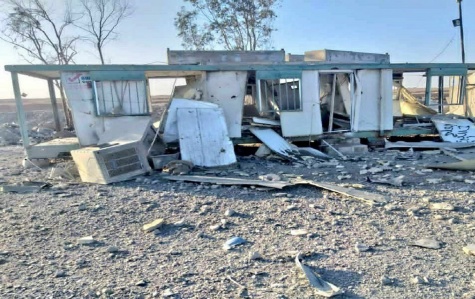
Eden Milligan | Head Editor
March 5, 2021
Last week, the U.S. government initiated an airstrike targeting Iranian-backed militias in Syria. Biden justified this attack as “self-defense” in retaliation for rocket attacks that were directed at U.S. bases earlier in the month.
The strike, which was the first military action of the Biden administration, was very controversial. In the Senate, Biden received criticism by both Democrats and Republicans for acting without the approval of Congress. “Offensive military action without congressional approval is not constitutional absent extraordinary circumstances. Congress must be fully briefed on this matter expeditiously,” democratic senator Kaine said. Senator Chris Murphy was also not “convinced that any president has the authorization required to take a retaliatory strike,” and he felt that the reasoning and justification Biden offered did not suffice.
Aside from the lack of transparency with Congress, another issue with the strike is the discrepancy in provided fatality counts. Despite the Pentagon’s claim that only one death and two injuries could be confirmed, the UK-based Syrian Observatory for Human Rights claimed that the U.S. airstrike killed at least 22 Syrian fighters. The SOHR is generally trusted throughout the western world, and is used by virtually every news source. However, these numbers may be more complicated than they seem; with bias to paint the U.S. in a positive light, the Pentagon official who disclosed the information may have only stated all of the deaths and fatalities that could be concretely confirmed as a direct result of the air strike, while the SOHR number may have been slightly broader or less verifiable. Still, there seemed to be a definite motive to underplay the damage of the airstrike. The media moved quickly past the event, and the government is yet to issue any updates on known deaths and fatalities.
Though these significantly lower casualty statistics might serve to lessen the moral blow of an already controversial attack in the reactions of the American public, these numbers may have only made the situation worse in regards to the public’s trust in the Biden administration.
“The failure to properly disclose the number of fatalities and injuries related to this incident, and furthermore, the cover-up of the actual number, is appalling,” junior Liam Hallinan said. “The people must know the effects of their government’s actions, for we cannot allow them to operate while we look on blindly.”
This tactic is certainly not unique to Biden’s administration; every president in the history of our nation has had a motive to paint the U.S. as a peaceable upholder of democracy and justice—as a model nation, not a violent aggressor. Naturally, Pentagon members under the Biden administrations would be inclined to withhold any information that was not concrete and demanded by the public in order to subtly skew the country’s foreign affairs with a patriotic bias. This bias, however, is seemingly no longer acceptable in an age of mass media, where people demand facts, not reassurance.
This event is particularly disappointing in light of President Biden’s consistent promise of promoting “unity.” This emphasis on national unity in a time of stark political division likely influenced the administration’s efforts to conceal the harsh reality of the airstrike—but does unity have to come at the price of transparency?
“Knowing the whole range of information, whether detrimental to unity or not, is the first step for unity,” junior Jet Stadick said. “The foundation of unity is information.”
While this suppression of information may have been an attempt to promote national unity, this unity might be fragile and baseless. Additionally, it ignores the importance of fostering international unity. Even if U.S. citizens trust their government’s actions, how does it reflect on our nation in the world’s view if the information we release contradicts with statements made by other countries?
According to Jet Stadick, people must focus on a broader unity that is just within the states. “I believe that global unity is more important than national unity,” he said. “We should hold the government accountable for upholding world peace over the pursuit of international interests.”
Stadick and Hallinan both believe the airstrike in Syria is justifiable; “it was a simple act of retaliation against an attack upon the US and our ally’s soldiers only weeks before,” Stadick said. But that doesn’t necessarily justify the lack of transparency in the information produced about the airstrike.
Unity is a complicated topic in a nation where so many contradictory opinions exist. Catering to all of these through encouraging common ground in pride in the nation, while also being upfront and honest about all of the nation’s affairs, is no easy feat. In the greater picture, maybe the fatality discrepancy in this particular event in Syria is insignificant to the government’s overall goal of peace and unity. However, this does not mean the citizens of America should ignore the government’s flaws. Unity through unquestioning obedience is not unity at all, but complacency. To be truly patriotic and truly united, we must hold our government accountable and urge it to make the right decisions. Unity built on the basis of progress and hope is far stronger than unity built on fabrications and half-truths.
“We should never blindly trust the government to do what’s best for us,” Stadick said. “The government is a service for the people, and we need to ensure that they’re working their best, internally and externally, for the advancement and wellbeing of Americans.”

Leave a Reply